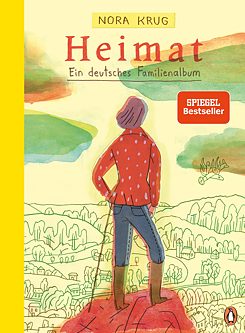Nora Krug
Dancing the polka in Milwaukee

Interview with writer and illustrator Nora Krug about her book “Belonging”, living as a German in the US and the potential of graphic memoirs to deal with the past.
By Johannes Zeller
Born in Karlsruhe in 1977, illustrator and writer Nora Krug grew up in Germany but then moved abroad and has lived in an English-speaking environment for 20 years. Today, her home is New York City. Her latest book Heimat is a graphic memoir – a mixture or graphic novel, family scrapbook and personal narrative. It is a detailed personal investigation into what the Second World War means for being German. In hand-written stories and illustrations, the author retraces her own family history. The book was released in autumn 2018 in Germany, the UK, Holland, France and the USA and will soon be published in six more languages.
Your latest graphic memoir is published in Germany with a different cover and title than in the USA. The German title is “Heimat – Ein deutsches Familienalbum”, the US one “Belonging – A German Reckons with History and Home”. Why the difference?
The working title was always Heimat, but the German publishers told me straight away that they did not like the word because it has negative connotations. The Americans, on the other hand, were all for it. And at the last minute, everything changed: the Germans suddenly voted in favour of Heimat as a title because we thought the right had hijacked the word long enough and we should claim it back. In the US, the publishers’ marketing department decided against using the German word.
The book tells lots of very personal stories from the days of the Second World War, some about your own family, some based on old photographs or correspondence. Why are you so fascinated by the subject?
 Cover of Nora Krug’s graphic memoir “Heimat”.
| Photo: © Nora Krug / Random House
We were taught a lot about the Second World Ware at school, of course. We visited concentration camps and studied the subject in depth. That was good as far as it went, but I didn’t feel I was being helped to learn from history. We confronted the paralysing guilt but not the scope for actively helping to keep a society democratic and tolerant. That might have alleviated the sense of guilt a little. Later, when I moved abroad, the confrontation with history was particularly intense. Hannah Arendt once said: “Where everyone is guilty, no one is”. If everyone has grandparents who collaborated, nobody gives it that much thought. In the US, I am frequently asked what my family did in the war. And for a long time, I did not know how to reply. That is when I started to feel I had a duty to find out more about the past. As a German, I am a representative of my country and its history and I think that history is a part of what we are. We can say “we are not guilty” because our generation were not involved in the Second World War but we cannot say we have nothing to do with history.
Cover of Nora Krug’s graphic memoir “Heimat”.
| Photo: © Nora Krug / Random House
We were taught a lot about the Second World Ware at school, of course. We visited concentration camps and studied the subject in depth. That was good as far as it went, but I didn’t feel I was being helped to learn from history. We confronted the paralysing guilt but not the scope for actively helping to keep a society democratic and tolerant. That might have alleviated the sense of guilt a little. Later, when I moved abroad, the confrontation with history was particularly intense. Hannah Arendt once said: “Where everyone is guilty, no one is”. If everyone has grandparents who collaborated, nobody gives it that much thought. In the US, I am frequently asked what my family did in the war. And for a long time, I did not know how to reply. That is when I started to feel I had a duty to find out more about the past. As a German, I am a representative of my country and its history and I think that history is a part of what we are. We can say “we are not guilty” because our generation were not involved in the Second World War but we cannot say we have nothing to do with history.
There are people in the United States who emigrated to the US, acquired US citizenship at some point and now call themselves Americans. There are also people who were born in US, have never left the country and proudly claim to be Italian or Irish. What do you hear from Americans of German descent?
I often hear people say “I am German”. When I first came here and didn’t know any better, I assumed that the person saying it had grown up in Germany. It was only later that I realised they were signalling their cultural identity. In the course of my book project, I travelled to the Midwest, where there are lots of people with German roots. At a dance festival in Milwaukee I met descendants of the “Danube Swabians”. They were very proud of their heritage, wore their blonde hair in plaits and danced the polka. I found it an odd experience. Not that there is anything wrong with celebrating German culture, but I found their absolute conviction and defence of German history quite very troubling.
Why did you make “Heimat” a graphic memoir?
Illustration has always been an extremely political medium. That is why it is often misused for propaganda. Illustrations communicate political and historical issues on a very direct, emotional level, which is different from a history book. Heimat focuses on memories from the war days and how we deal with them.
You have written a number of books and comics that address historical issues and even war but none of them have dealt so directly with your own past. Was it easier to start with stories where you were on the outside looking in?
My agent asked me at one point if I didn’t fancy telling a German story. And at that moment I realised that my entire perception of the war was actually shaped by the fact that I am German. But for a long time I shied away from examining the war from a German perspective. I thought I did not have the right to do so. My family were neither known war criminals nor resistance fighters, so I doubted that anyone would be interested. But it is particularly important to understand those who passively cooperated with the regime. I was also afraid that the book might be misunderstood, however. It is not an attempt to overcome the guilt. It is neither an explanation nor an excuse, just an analysis of my own family’s guilt.
The book has now been released – what have the reactions been like?
So far, it has not been misunderstood. I have presented it at a number of Jewish book festivals and have been delighted to see how positively people have responded to it, including Holocaust survivors. The only criticism to date has come from the far right. And if I have to be hated by anyone, I’m happy for it to be them.